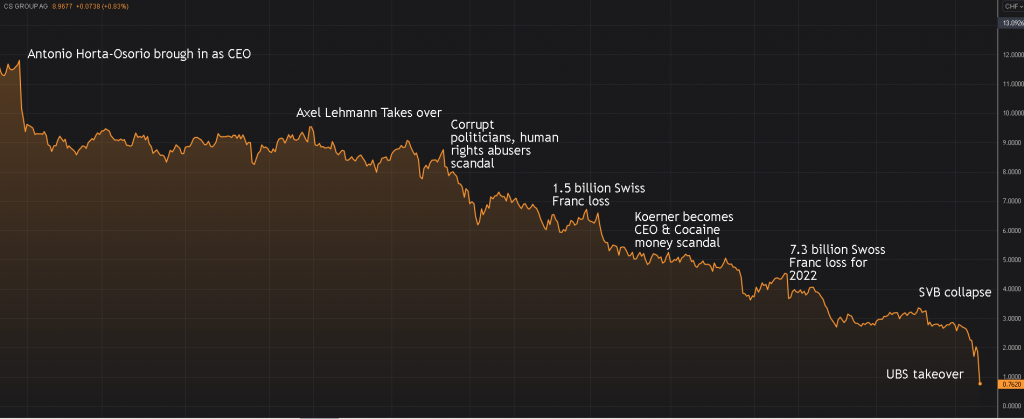
Last week the shares of Credit Suisse fell to an all-time low, causing the Swiss National Bank to step in with a liquidity lifeline of up to 50 billion Swiss francs ($54 billion). This marked the first major bank intervention since the 2008 global financial crisis. The bank’s shares have nosedived nearly 98% since their peak in April 2007, while credit default swaps, insuring bondholders against defaults, reached record highs.
Years of underperformance in investment banking, along with numerous scandals and risk management failures, have contributed to the bank’s current predicament. In response, Credit Suisse tried to undergo a comprehensive strategic overhaul. Ulrich Koerner, a long-time Credit Suisse executive, replaced Thomas Gottstein as CEO in July, following Gottstein’s struggle with a series of crises, such as the collapses of Archegos Capital and Greensill Capital.
To address the bank’s troubled culture, Antonio Horta-Osorio, the former Lloyds Banking Group CEO, was brought on board in April 2021. However, Horta-Osorio resigned in January 2022 due to COVID-19 quarantine violations and was replaced by UBS executive Axel Lehmann. In February 2022, the bank faced another controversy as leaked data revealed Credit Suisse had provided services to human rights abusers, corrupt politicians, and sanctioned businessmen for decades.
Further complicating matters, in June 2022, Credit Suisse was found guilty of failing to prevent a Bulgarian cocaine trafficking gang from laundering profits through the bank between 2004 and 2008. As litigation expenses mounted and performance lagged behind its peers, the bank’s share price and earnings took a hit. Following a 1.593 billion Swiss franc loss in Q2 2022, Koerner took over as CEO and initiated another costly transformation project with Lehmann.
The transformation included spinning off Credit Suisse’s investment banking division to form U.S.-based CS First Boston, significantly reducing exposure to risk-weighted assets, and raising $4.2 billion in capital, which led the Saudi National Bank to take a 9.9% stake and become the largest shareholder.
Credit Suisse reported a full-year net loss of 7.3 billion Swiss francs for 2022, predicting another “substantial” loss in 2023 before returning to profitability in 2024. Concerns about liquidity led to significant asset outflows, amounting to 110.5 billion Swiss francs in Q4 2022. By March 2023, shares traded at a mere 2.85 Swiss francs per share.

Timeline of Credit Suisse stock price and events. Source: Refinitiv Eikon
The bank’s troubles continued when the U.S. Securities and Exchange Commission delayed its 2022 annual report due to a “technical assessment of previously disclosed revisions to the consolidated cash flow statements” for 2019 and 2020. This setback, combined with the collapse of U.S.-based Silicon Valley Bank, caused Credit Suisse’s share price to freefall further.
On March 9, Credit Suisse announced that it would exercise its option to borrow up to 50 billion Swiss francs from the Swiss National Bank under a covered loan facility and a short-term liquidity facility. The central bank and the Swiss Financial Market Supervisory Authority issued a statement that Credit Suisse “meets the capital and liquidity requirements imposed on systemically important banks”.
This support led to a 20% surge in the share price, temporarily reassuring depositors.
This, however, was not enough and this Sunday the Swiss banking powerhouse UBS successfully acquired Credit Suisse at a cost of $3.3 billion or 0.75 Swiss francs per share, following the rejection of earlier offers of 0.25 and 0.50 Swiss francs per share as the only other option for Credit Suisse was bankruptcy.
This transaction, however, has consequences for Credit Suisse’s stock, which has plummeted nearly 65%, essentially wiping out shareholders. At the time of acquisition, Credit Suisse will possess a price-to-book ratio of 0.054.
In response, the Swiss government has opted to increase the financial lifeline to $100 billion, a move anticipated to bring crucial monetary backing and stability to the nation’s banking sector.
The primary goal of this imposed merger is to ensure a more secure future for Credit Suisse’s clientele and prevent widespread fallout.
Only time will tell if this shotgun wedding will be enough…
Risk warning:
This article is for information purposes only. It does not post a buy or sell recommendation for any of the financial instruments herein analysed.
Deltastock AD assumes no responsibility for errors, inaccuracies or omissions in these materials, nor shall it be liable for damages arising out of any person’s reliance upon the information on this page.
76% of retail investor accounts lose money when trading CFDs with this provider.